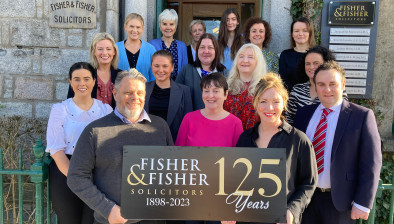NI High Court: Parties allowed to vary terms of £2m will to benefit deceased’s children

Northern Ireland’s High Court has approved the variation of a last will where it found that the new provisions were of benefit to the deceased’s children.

About this case:
- Citation:[2022] NICh 11
- Judgment:
- Court:NI High Court
- Judge:Madam Justice McBride
The court noted that it would be beneficial for the children to receive a lump sum at the age of 25, especially where the trust would make provision to support the children in pursuing a university education.
Background
The deceased, Thomas Henry Egerton, died on 17 April 2020. He was survived by his widow, Imelda, and his four children. He made his last will in March 2013.
His will stated that the residue of his estate, including both real and personal property, after the payment of debts and funeral expenses, should be distributed in the following order:
“I leave, devise and bequeath to my trustees upon trust for the benefit of my wife Imelda Egerton for her life and on her death to my children then surviving in equal shares absolutely and in the event that any of my said children being under the age of 25 years then to be held upon trust by my trustees until that child reaches the age of 25 years whereupon they shall take their entitlement absolutely”
The children could therefore only benefit from the will trust during Imelda’s life if she consented.
The deceased’s estate comprised assets valued at approximately £2 million. This included the former matrimonial home, as well as various commercial properties and liquid assets both within Northern Ireland and Ireland.
The plaintiffs were the executors of the estate, and the trustees of a trust in his name. The defendants included two minor children of Mr Egerton.
Originally Imelda Egerton, their mother, was to act as their guardian ad litem. However, given the potential conflict between her interests and those of the minor children, it was agreed that their aunt would act as next friend.
The parties were seeking the permission of the court to vary the terms of the will. The variation would cause Imelda to receive a lump sum of £25,000 absolutely, while Sonya, the adult daughter from a former marriage, received a gift of £75,000.
Three trusts would also be created in the sum of £75,000 for each of the children who had not yet reached the age of 25.
The variation also clarified that the residue of the estate would be held on trust for Imelda’s benefit for her life, and on her death it would pass to the children.
It also contained a clause in the event that any of the testator’s children died before age 25, in which case any children they had would take their parent’s share at age 18.
Consideration
In order for this variation to comply with the provisions of section 57 of the Trustee Act (Northern Ireland) 1958, the court had to be satisfied that the plaintiffs had locus standi; that the proposed variation was a variation and not a resettlement; and that the proposed variation was for the “benefit” of the minor children.
Question 1 – Did the plaintiffs have locus standi?
The application was brought by the trustees. In Tracey v McCullagh [2018] NI Ch 15, the court held that trustees have locus standi to bring such an application, therefore, the plaintiffs could clearly bring the application.
Question 2 – Was the proposed variation a variation or resettlement?
In assessing this, the court noted that the proposed variation comprised only a small part of the estate. It represented less than 20 per cent of the entire estate.
The remainder of the estate continued to be governed by the original will. Therefore, this was a variation, rather than a resettlement of the will, and fell within the scope of section 57.
Question 3 - Was the proposed variation for the benefit of the minor children?
In assessing this, the court considered Re Elizabeth K Gates Estate Trust [2000] 3 ITELR 113, where the Royal Court of Jersey determined that it was undesirable for minor children to inherit a large sum of money at a young age.
Therefore, it can be reasonable to defer entitlement to a trust until a beneficiary is older. In this case, the court found that the proposed variation had a number of advantages for the minor children.
Firstly, it gave the minor children their inheritance at 25, while under the original will the children had no entitlement to the capital until Imelda’s death.
Secondly, the variation removed some uncertainty in the will regarding how the funds were to be distributed if any of the children predeceased Imelda.
Thirdly, the proposed trusts had certain tax advantages, as they came within section 71(d) of the Inheritance Tax Act 1984, commonly known as the “18-25 Trusts”.
Fourthly, the court noted that giving Imelda, their mother, a capital sum may indirectly benefit the children, as the children reside with her.
Finally, the proposed variation ensured that the minor children could look forward to a substantial inheritance on their mother’s death, alongside any funds that she shared with them consensually before then.
The court also noted that any disadvantages were minimal. For example, if Imelda died shortly after making the variation, each child would lose a quarter of the £25,000 capital advanced to her.
However, the court found this unlikely, given her age. Further, the amount involved was small, given the size of the entire estate.
The second disadvantage was that there are more administrative costs with postponing the inheritance until age 25.
Conclusion
The judge noted that in deciding whether the proposed variation was for the minors’ benefit, the court must consider it as a whole.
Madam Justice Denise McBride stated: “I consider on balance that the advantages in this case outweigh the disadvantages and, accordingly, I consider that the proposed variation is in the children’s best interests”.
The court noted that the scheme particularly appeared to be of benefit for the children’s education. The scheme would allow for the release of funds for the minor children’s education, including university if that was within their ability.
The proposed variation also allowed a power of advancement, which meant that they could receive money during their years at university.
Ultimately, the court granted the proposed variation.











